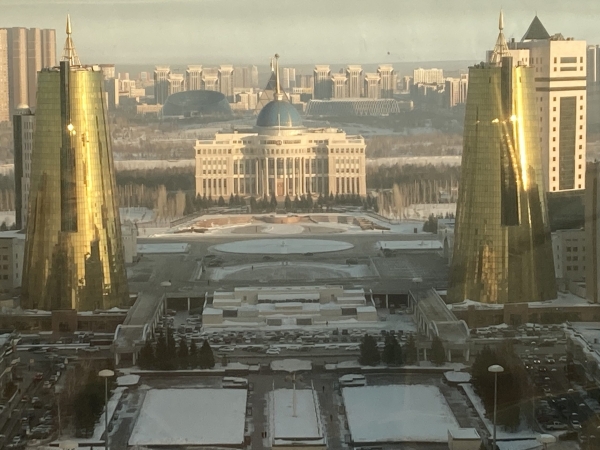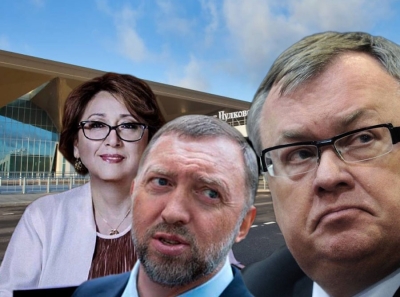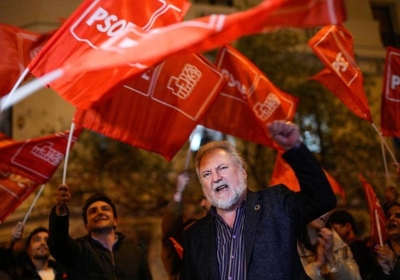EU and Kazakhstan look to the future as they mark a 30 year relationship Thursday, 02 February 2023

Kazakhstan has become one of European Union’s most important strategic partners as the EU looks for reliable sources of energy and natural resources, as well as secure trade routes between Europe and Asia. A joint statement marking 30 years diplomatic relations, highlighted the EU’s full support for Kazakhstan’s major political and economic reforms to create a new just and fair republic, writes Political Editor Nick Powell.
Kazakhstan’s political reform programme is nearing completion with the election of a more powerful lower house of parliament, the Mazhilis, next month. Voters will have at least seven political parties to choose from in their third trip to the polls in less than a year, following a referendum on constitutional reforms and a presidential election. New local bodies will also be elected in the vote on March 19.
“I truly believe our country is in the process of something special”, Deputy Foreign Minister Roman Vassilenko told foreign journalists in the Kazakh capital, Astana. He said his country was now hardly recognisable as the nation that was rocked by the events known as Tragic January, at the start of 2022. Initially, peaceful protests were hijacked by armed men and 238 people died, with the worst violence in the largest city, Almaty.
Many of those arrested were treated leniently, with less than 10% of prosecutions leading to imprisonment. But those thought to be the ringleaders, including former members of the National Security Council, are still being dealt with. There is no hesitation by ministers and prosecutors in referring to what happened as an attempted coup d’etat.
Political and economic reforms were brought forward in response, in a determined effort to ensure that every citizen feels that he or she has a stake in the country. The Agency for Strategic Planning and Reforms is driving forward policies designed to create fair competition, a stable tax policy and a transparent public procurement process.
Such progress at home has come at a time when Kazakhstan’s proudly pragmatic multi-vector foreign policy is facing the tensions and challenges that have flowed from Russia’s invasion of Ukraine. Despite the importance of its relationship with Russia, Kazakhstan’s President Kassym-Jomart Tokayev has been steadfast in defending the principle of the inviolability of borders.
AdvertisementIn a joint statement marking 30 years of EU-Kazakhstan relations, High Representative Josep Borell and Kazakh Foreign Minister Mukhtar Tileuberdi reiterated, in the light of “the current geopolitical context”, their firm commitment to the UN Charter, international law and the principles of sovereignty and territorial integrity.

The EU also stated its full support for Kazakhstan’s large-scale political and economic reforms to advance its vision of a just and fair country, as well as its commitment to a full and transparent investigation of the events of January 2022. There was also much to say about the growing economic relationship.
An Enhanced Partnership and Cooperation Agreement was signed in 2020, covering 29 broad areas of cooperation -from trade and investment to aviation, education and research, civil society and human rights. More recently, a memorandum of understanding was signed on a strategic partnership in sustainable raw materials, batteries and renewable hydrogen value chains, crucial to green and digital transitions.
Kazakhstan produces 90 million tonnes of oil a year, almost all for export, mostly to Europe via a pipeline through Russia to the Black Sea. As Roman Vassilenko observed, connecting to the open sea is always a priority for the world’s largest landlocked country. Agreement has been reached with Azerbaijan to export 6.5 million tonnes through its pipeline. A deal with the Union Arab Emirates will see the construction of two additional oil tankers.
The Deputy Foreign Minister said that alternative routes, especially the Trans-Caspian route, need to be developed more intensively, applying the EU’s technologies and resources through the Global Gateway project. He suggested that the EU and other stakeholders had been given a blueprint by the agreement between Kazakhstan, Azerbaijan, Georgia and Türkiye to reduce bottlenecks, which will benefit not just the EU’s trade with Kazakhstan but with the whole of Central Asia and with China.
Share this article:



